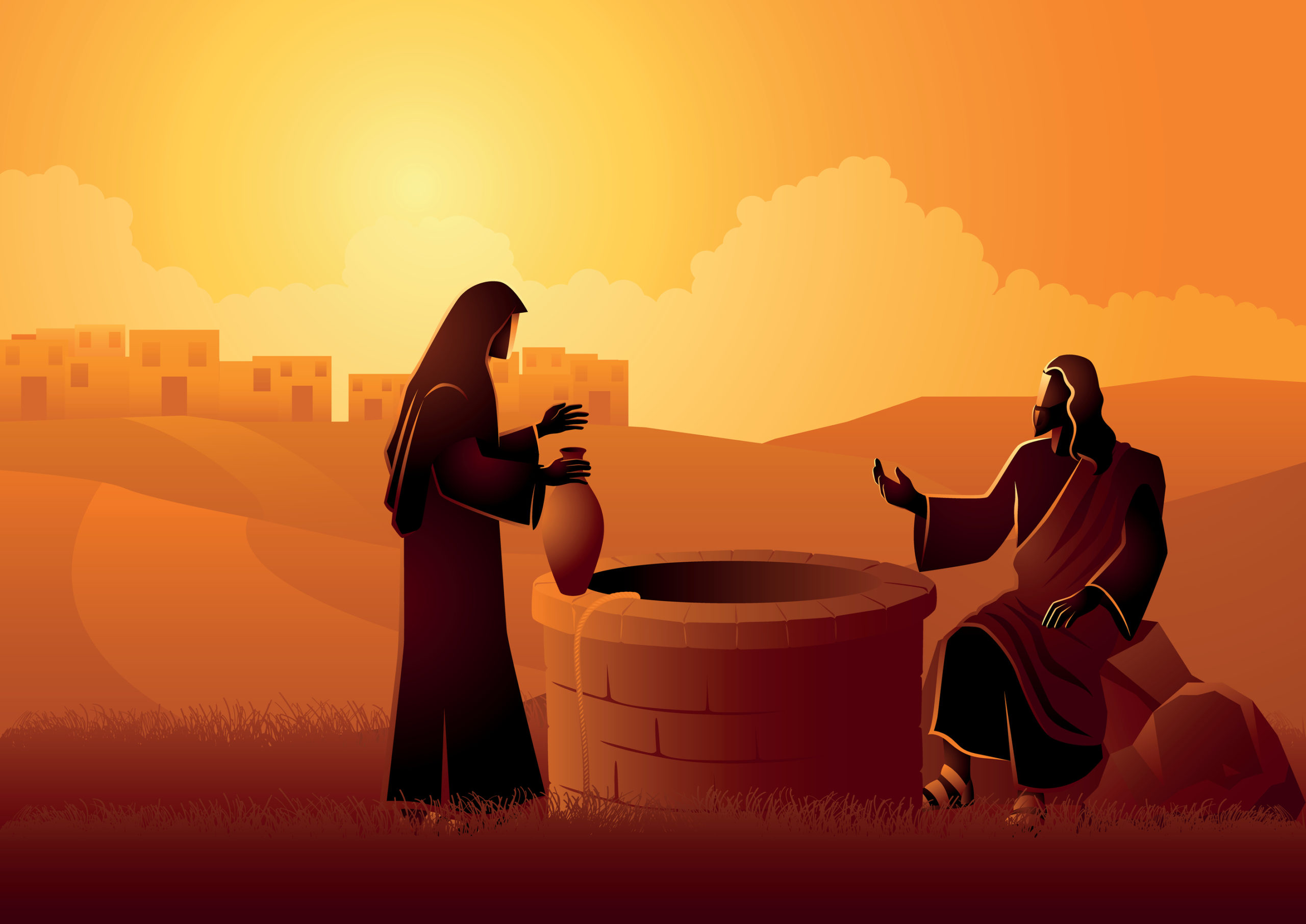This post is part of an ongoing series in the study of John we are doing during January. Subscribe to the blog for daily updates in the Bible Study posts. Subscribe to the podcasts to hear our discussion of the book of John throughout this month. Join us in your daily devotions as we travel through this fascinating account of the life of Christ.
***
To understand Jesus’s encounter with the Samaritan woman at the well in John 4, we need to contrast it against His encounter with Nicodemus in John 3.
Nicodemus was a leader and teacher among the people of God in Israel. He was a man of prominence and reputation, but in John 3:10, Jesus marvels: “Are you a teacher of Israel and don’t know these things?” Nicodemus’s curiosity led him to come to Jesus hidden in the dark hours of the night. Many great things have been conveyed by the end of the religious leaders’ conversation with Jesus, but there is no evidence that Nicodemus understood any of it. Nicodemus remained a Pharisee, a leader of Israel, and a teacher, but not a follower of Christ.
The woman at the well, on the other hand, asked Jesus many questions, but they were all the wrong questions.
“How is it that You, a Jew, ask for a drink from me, a Samaritan woman?” she asked Him. John 4:9
“Sir,” said the woman, “You don’t even have a bucket, and the well is deep. So where do You get this ‘living water’? You aren’t greater than our father Jacob, are You? He gave us the well and drank from it himself, as did his sons and livestock.” John 4:11-12
The woman said to Him, “Sir, I perceive that You are a prophet. 20 Our fathers worshiped on this mountain, and you Jews say that in Jerusalem is the place where one ought to worship.” John 4:19-20
When she attempted to speak with some level of religious knowledge, she betrayed her ignorance of the ways of God just as Nicodemus did. While Jesus marveled at the ignorance of Nicodemus to the Samaritan woman at the well, He simply said:
You Samaritans worship what you do not know. We worship what we do know, because salvation is from the Jews. John 4:22 (HCSB)
The confusion of the woman at the well when speaking to Jesus is not too different from that of Nicodemus. The manner of questions and statements she presents to Jesus is close to foolishness when one considers the person she is speaking. The same could be said of Nicodemus when he asked, “How can anyone be bone when he is old? Can he enter his mother’s womb a second time and be born?”
But the end of the conversation Jesus had with the Samaritan woman at the well and the conversation He had with Nicodemus is where the great distinction is established. Nicodemus presumably faded back into the night from which he came to Jesus. His curiosity was quenched, and he reclined into his prominent seat of authority and knowledge as a leader and teacher of Israel. But for the woman at the well, the conversation ended much differently:
And many of the Samaritans of that city believed in Him because of the word of the woman who testified, “He told me all that I ever did.” So when the Samaritans had come to Him, they urged Him to stay with them; and He stayed there two days. And many more believed because of His own word. Then they said to the woman, “Now we believe, not because of what you said, for we ourselves have heard Him and we know that this is indeed the Christ, the Savior of the world.” John 4:39-42 (NKJV)
The Difference Between Nicodemus and the Woman at the Well
When we contrast the difference between Nicodemus and the woman at the well, we not only see why one ended up becoming a fountain of faith into her community, but we also see the nature of the heart that draws God’s delight.
Nicodemus was educated. He was wise. He was striving to be the best he could be. Nicodemus was not a bad or sinister character. But his conversation with Christ did not end with a surge of faith because ultimately, his heart had options. Elsewhere in the gospels, Jesus warned how difficult it is for a rich man to enter the Kingdom of God. Material wealth is not the only sort of riches that can prevent us from clinging to the good news of the Kingdom of God. Nicodemus had a wealth of knowledge, reputation, status, and esteem. It was difficult for him to part with those riches to follow Christ into the risky waters of faith.
The woman at the well had little to hold her back. The fact that she came to the well at midday when the other women of the town came in the cooler morning or evening hours suggests she deliberately tried to separate herself from the community. This woman carried some shame and embarrassment that made her an outsider. Even her status as a Samaritan woman subjected her to anticipated discrimination when she first met this Jewish man. When confronted by Jesus about her marriage situation, we learn that something was amiss that further isolated her to loneliness even within her family.
Jesus said to her, “Go, call your husband, and come here.” The woman answered and said, “I have no husband.” Jesus said to her, “You have well said, ‘I have no husband,’ for you have had five husbands, and the one whom you now have is not your husband; in that you spoke truly.” John 4:16-18 (NKJV)
When finally stripped of her defenses and pretenses, the woman at the well is shown as a person longing for true life.
Springs of Living Water
Every human heart was fashioned to need the springs of living water that Jesus promised in John 4.
Jesus answered and said to her, “Whoever drinks of this water will thirst again, but whoever drinks of the water that I shall give him will never thirst. But the water that I shall give him will become in him a fountain of water springing up into everlasting life.” John 4:13-14 (NKJV)
Many hear the call of Christ and reject it outright. Others hear Him and marvel at His insightful teachings but still walk away with an emptiness in their soul. The woman at the well demonstrates the model for us to follow. Rather than holding on to her habits of shame, hiding, and pride, she gave in and embraced Him fully. For her, Christ became the one who told her all that she ever did. To put it another way, He knew her fully and embraced her still.
Considerations
- What habits of self-protection might stand between me and the full benefit of Christ in my heart?
- When I encounter Christ, do I find insightful teaching or life-giving resource?
- Does the end of my encounter with Christ result in my return to everyday life or an increase of new faith?
Subscribe to the blog as we continue our walk through the book of John tomorrow.
[email-subscribers-form id=”2″]





What do you think?
Show comments / Leave a comment